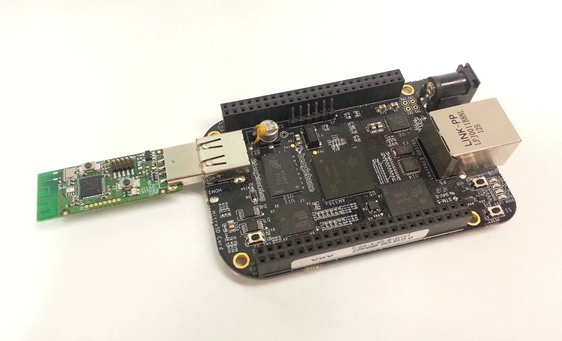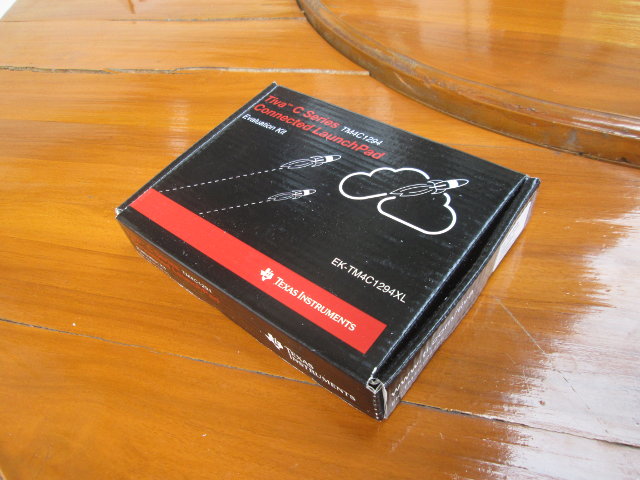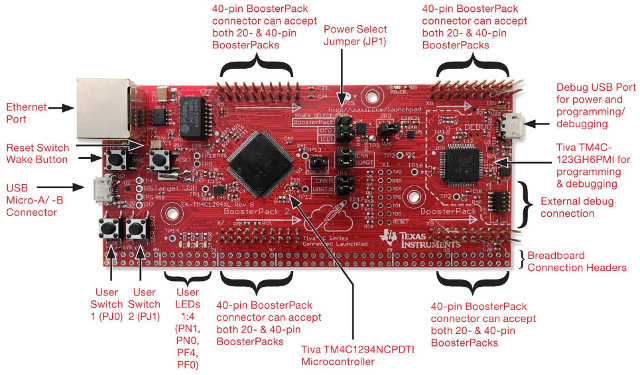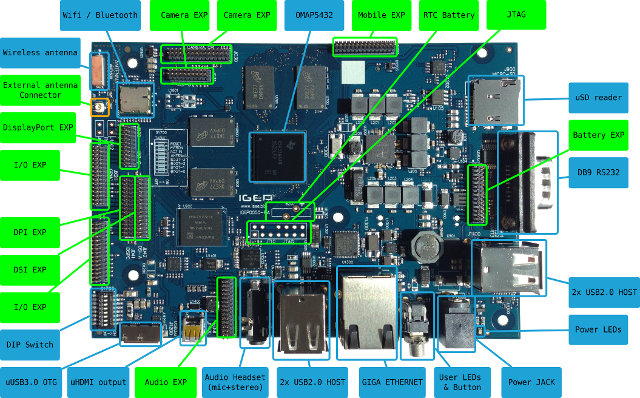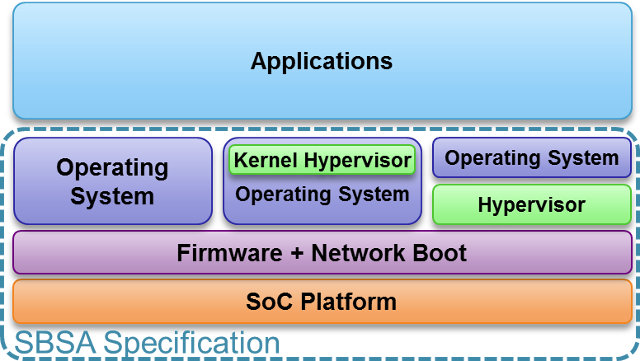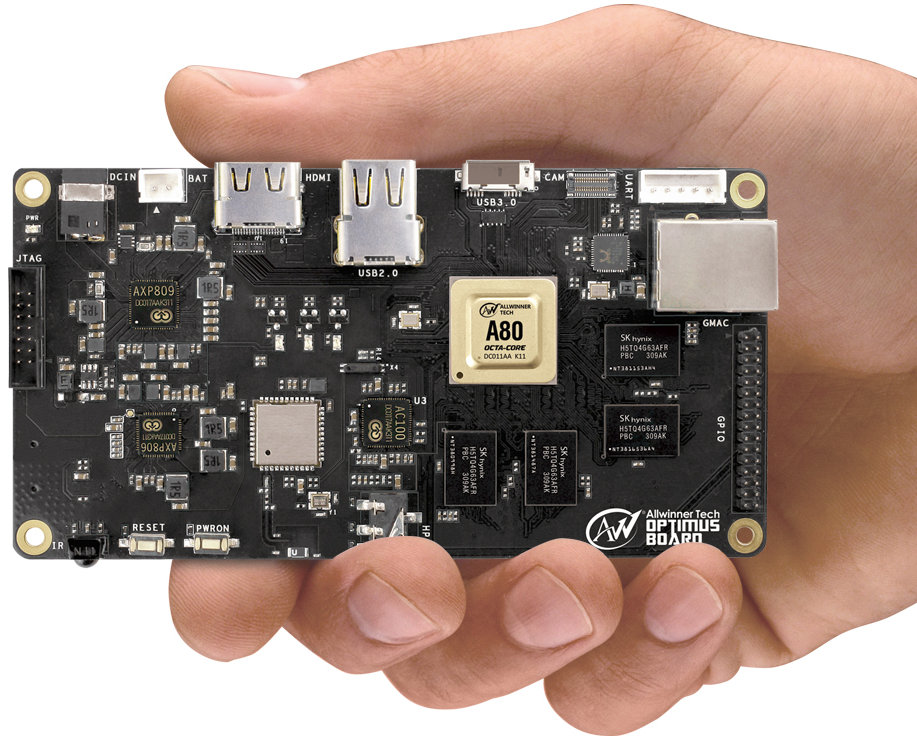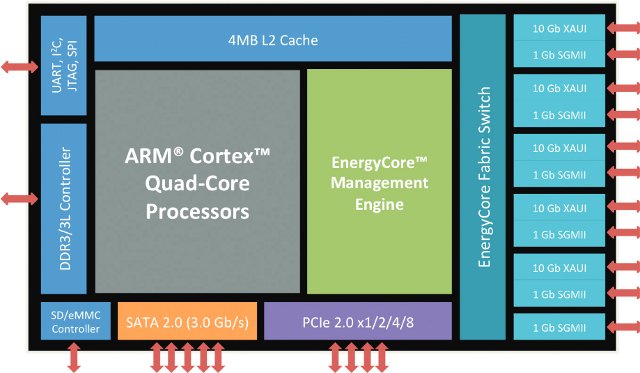Texas Instruments has recently release a complete Linux based Zigbee home automation gateway based on BeagleBone Black development and CC2531 Evaluation Module Kit hardware which you can purchase for about $100 in total, and including Z-STACK Ubuntu gateway installer, as well as Z-STACK Home, a ZigBee Home Automation (ZHA 1.2) compliant protocol stack for the company’s CC2530 and CC2538 SoCs. I won’t go into details about the BeagleBone Black as I have already covered it into details previously. However, the hardware has slightly changed since the initial release, as the 2GB eMMC has now been replaced by a 4GB eMMC, and price has been increased to about $55. CC2531 evaluation module kit is comprised of CC2531 USB Dongle which you can connect to the USB port of a PC, or in this case a BeagleBone Black, for 802.15.4 / ZigBee applications. TI also provides CC2531 USB Firmware Library on their site to let developers […]
Texas Instruments Tiva C Series Connected LaunchPad Unboxing and Quick Start Guide
Texas Instruments Tiva C Series TM4C1294 Connected LaunchPad is an evaluation kit for the Internet of things with a Cortex-M4 MCU (Tiva TM4C1294), an Ethernet port, and USB interfaces for power and debugging. At $19.99 including shipping via Fedex, it’s one of the cheapest ways to get devices online. I’ve purchased one via TI e-Store, and already received it. I’ll post some pictures of the kit, go through the Quick Start Guide, and provides links to resources to go further. EK-TM4C1294XL Connected LaunchPad Unboxing I’ve received the kit in the package below with feature a QR Code linking to http://www.ti.com/launchpad, as well basic specifications (refer to my previous post for specs), list of tools (Code composer studio, Tivaware, Keil, IAR…) and package content. In the box we’ve got the board itself, a retractable Ethernet cable, a USB to micro USB cable for power and debugging, and Connect LaunchPad Quick Start […]
Texas Instruments Tiva C Series TM4C1294 Connected Launchpad Sells for $20
There are now many ultra low cost MCU development kit selling for $15 to $25 such as STMicro Discovery Board, but for this price, they’ll usually just feature the MCU, a micro USB, pin header, maybe and maybe some sensors, and they usually lack any form of connectivity, at least without extra hardware. With Tiva C Series TM4C129 Connect Launchpad, Texas Instruments brings a board that can be used for IoT application out of the box thanks to the addition of an Ethernet port. The board sells for just $19.99, which means you could easily make something like a connected 4-relay control system for about $25. Connected LaunchPad evaluation kit specifications: MCU – Texas Instruents TM4C1294NCPDT ARM Cortex-M4 @ 120MHz with floating point, 1MB Flash, 256KB SRAM, 6KB EEPROM, Integrated 10/100 Ethernet MAC+PHY, data protection hardware, 8x 32-bit timers, dual 12-bit 2MSPS ADCs, motion control PWMs, USB H/D/O, and many […]
IGEPv5 OMAP5432 Development Board is Now Available for 149 Euros
ISEE IGEPv5 development board announced in October 2013, and powered by Texas Instrument OMAP5432 dual core Cortex A15 + dual core Cortex M4 SoC, POWERVR SGX544MP2 and Vivante GC320 GPUs is now available for as low as 149 Euros. There are two versions: “IGEPv5 OMAP5432 Communication Edition” for hobbyists with limited support, and “IGEPv5 OMAP5432” directly supported by ISEE. There’s also “IGEPv5 Custom Design” if you have specific requirements for your product. Hardware specifications are shared by both versions but with significant differences (CE = IGEPv5 OMAP5432 Community Edition, ISEE = IGEPv5 OMAP5432): SoC – Texas Instruments OMAP5432 dual core Cortex A15 up to 1.5 GHz (CE) or 2 GHz (ISEE), dual core Cortex M4, with POWERVR SGX544 dual-core GPU, Vivante GC320 GPU, and TMS320DMC64x DSP System Memory CE – 1GB DDR3 @ 1066 MHz ISEE – Up to 4 GB DDR3 RAM expandable to 4GB Storage CE – No eMMC, […]
ARM Unveils Server Base System Architecture Specification (SBSA) to Standardize ARM based Servers
64-bit ARM based servers should hit the market later this year or earlier in 2015 with SoCs such as Applied Micro X-Gene or AMD Opteron A1100. ARM still has the lead in terms of efficiency with a lower dollar per watt ratio, but Intel is closing in with their new Avoton server-on-chips. However, there’s one aspect where Intel is clearly in the lead: standardization and compatibility. ARM is very flexible, and allow SoC designers to create more or less what they want, but it comes at the cost that most ARM based systems are not capable of running mainline Linux, and instead use vendor trees. With many applications, that may not be critical, but when it comes to data-centers, companies want to be able to run the latest Linux version with the latest security patches as soon as possible, and want to lower the total cost of ownership (TCO), so […]
What to Expect from AllWinner, Rockchip, Mediatek, and Other Silicon Vendors at CES 2014
CES 2014 is coming soon, and it will take place on 7 – 10 January, 2014, and we can expect some interesting SoC news. Samsung suggested they will unveil their 64-bit ARM SoC (Exynos 6?) at CES 2014, Nvidia will hold a press conference to “showcase new NVIDIA Tegra mobile technologies, gaming innovations, and advanced automotive display technologies”, and Qualcomm has been quiet for now. However, several Chinese SoC vendors, namely AllWinner, Rockchip, and Mediatek, have already announced what they will showcase at CES 2014, albeit with few details. AllWinner at CES 2014 Allwinner announced will showcase their OptimusBoard based on their Ultra Octa-Core A80 SoC, as well as 4G tablets powered by Allwinner A31/A31s, and dual-SIM phablets sporting A23 dual-core. Allwinner A80 is an Octacore processor featuring four ARM Cortex A7 cores, and four Cortex A15 cores @ 2.0GHz together with an unnamed GPU offering 2x more performance over previous […]
ARM Based Servers and Servers-on-a-Chip (SoCs) at ARM Techcon 2013
ARM Techcon 2013 took place on October 29 – 31, 2013, in Santa Clara, and several companies announced servers, or chips for server based on ARM technology. None of those are for home used, but for now ARM based servers target enterprise and cloud data. Yet end users may them indirectly when they access social networks such as Facebook, or other online services such as Paypal. Calxeda ECX-2000 SoC After their ECX-1000 quad core Cortex A9 Server-on-chip, Calxeda has announced ECX-2000 SoC featuring four Cortex A15 cores. The new SoC provides about twice the performance, 3 times the memory bandwidth, and 4 times the memory capacity (up to 16GB RAM) of the earlier chip. One of the key advantage of Cortex A15 over Cortex A9 is hardware virtualization that allows support for KVM and Xen hypervisors. ECX-2000 is supported in Canonical Ubuntu Linux 13.10 and can run Havana Openstack. Other […]
Linaro 13.08 Release With Linux Kernel 3.11 and Android 4.3
Linaro 13.08 has been released with Linux Kernel 3.11-rc6 (stating), Kernel 3.10.9 (LSK – beta), and Android 4.3. This month is the first release based on Android 4.3, which was only pushed to AOSP at the end of last month. I can also see work on new SoCs/hardware this month with Texas Instruments Keystone II ARM Cortex A15+DSP SoC and Fujitsu AA9 board (Which processor?, I could not find out). A lot of work also appears to have gone in OpenEmbedded, further optimizations have gone into NEON optimized AES encryption in OpenSSL, and more. It’s also the first time I can see a Ubuntu Raring engineering build image for HighBank (Calxeda Energycore). Here are the highlights of this release: Android Engineering Android stack was tuned to achieve 100% CTS pass result on Android 4.3 Analyzing the UEFI EDK II boot loader for Android completed, implementation of fastboot application and USB […]


